The Love that Feels and Heals in Guillén || Review [Eng/Esp]
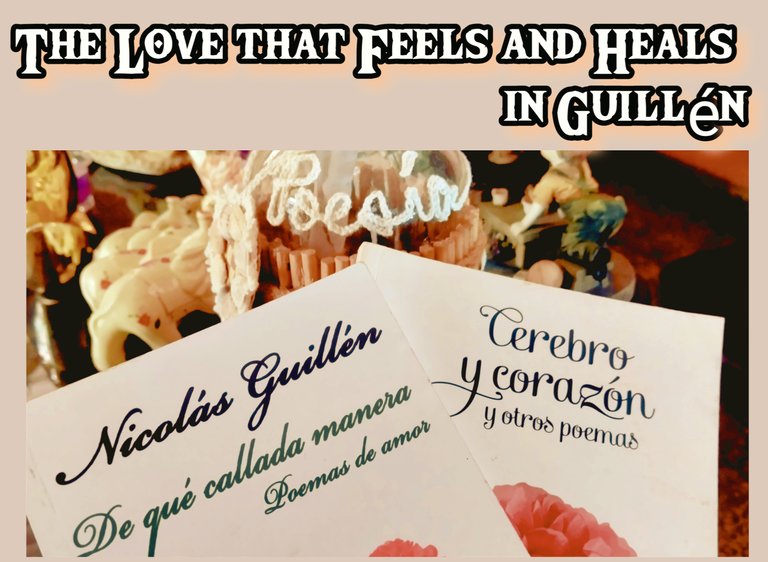
I vividly remember the day one of these two books came into my hands. During a Book Fair in my city, several poets, including myself, had been invited to a reading about the love poetry of Nicolás Guillén, that Nicolás Guillén we regard as our national poet and whom we always see from his angle as an anti-racist poet championing Afro-Antillean causes.
Guillén was born in my city and quickly became one of the most distinctive faces of Antillean poetry, the genuine singer of this island's mestizaje (racial and cultural mixing). But, alongside those protest verses we turn to again and again, there are also poems where a lyrical heart dedicated to love beats powerfully.
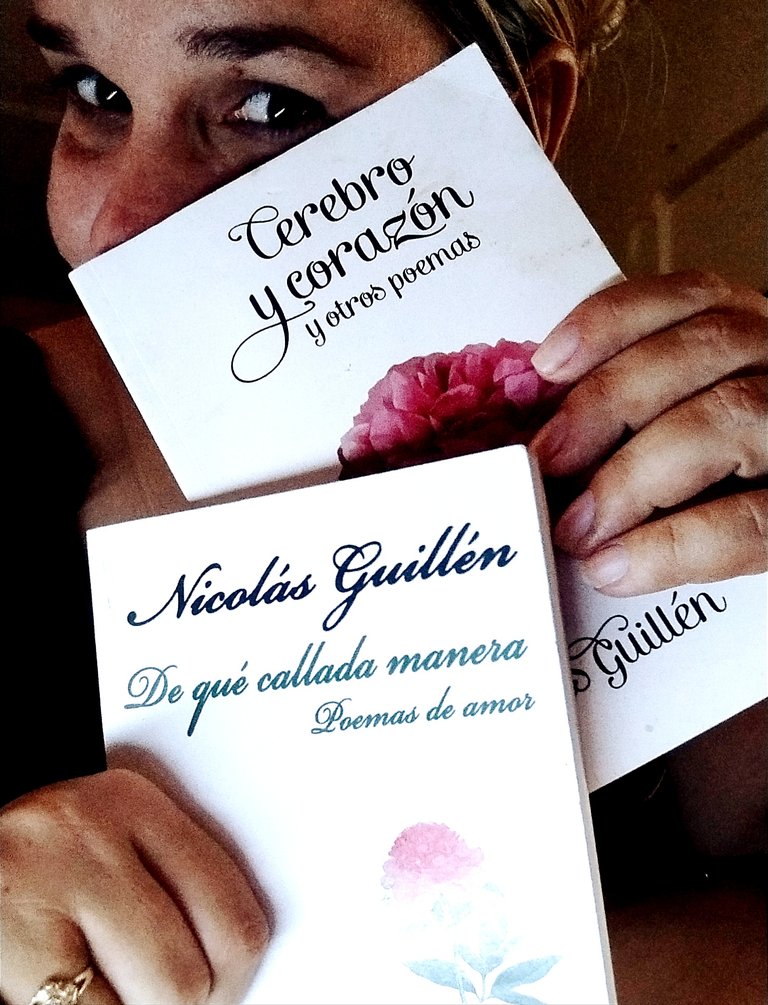
That afternoon, as the book of Nicolás Guillén's love poetry came into my hands, I heard from a writer's voice one of the most painful elegies I have ever heard from anyone, and it was by him, the author of Tengo and Sóngoro Cosongo.
Later, with the passage of time, another book of poetry by an even younger Guillén arrived: Cerebro y Corazón (Brain and Heart), and I could once again feel that romantic poet whom they try to sell to us with a different face and a different voice.
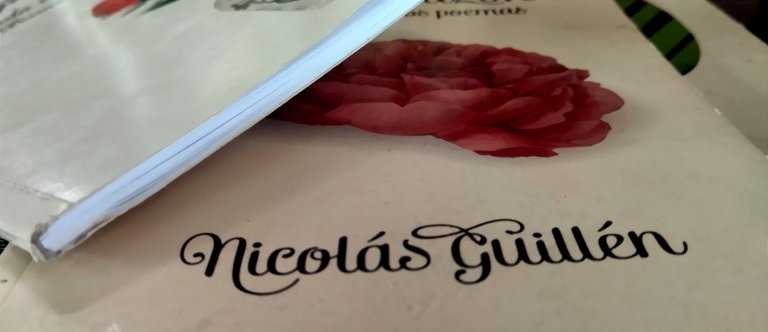
Love in Guillén's poetry is concrete and embodied; it is not an abstract or ethereal ideal, but a passion lived through the body and the geography of skin and pain.
So close to you, why must you seem so far?
Why call it night, if it is noon today?
If my skin burns, why is your skin so cold?
If I say life, why do you answer death?
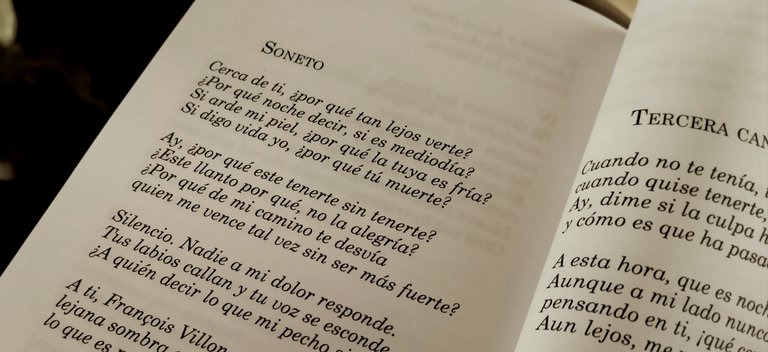
Although he wrote mostly from modernism or the avant-garde, in this sonnet we see a Guillén stripped bare of feelings, crying out for the love that he feels and that heals. There is a lovestruck and nostalgic man who turns his poetry, not into an appendix of his work, but into an intimate and human foundation for all of it.
The compilation of his love poetry ends with the most heart-wrenching of poems, about whose creation I have heard rumors and anecdotes. Remember that Nicolás Guillén, even as the National Poet of my country, was from Camagüey, like me, and on the streets, so many stories are told. They say that Guillén never wanted to publish that elegy with which I once fell in love and which I read while painfully wounded by a romantic disappointment, because he did not intend for the protagonist of such intense verses to read it. Someone convinced him, and today I keep it within these pages to accompany me as well.
The shape of death is not a skull.
It is your absence
like a scorched plain.
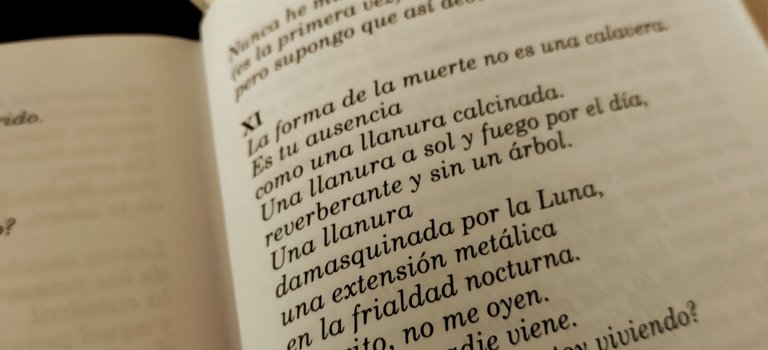
As you can see, his love poetry is marked by a profound melancholy and a sense of loss. We see how the same poet who sang of bodily joy with such vitality does not shy away from the pain that the same love can cause when it leaves.
In Cerebro y Corazón, the other book I share with you today, there is a young Guillén who exhibits the very first of his poetic production, where one could already see how he communed love with the concerns that later made him one of the pillars of 20th-century Hispanic American literature.
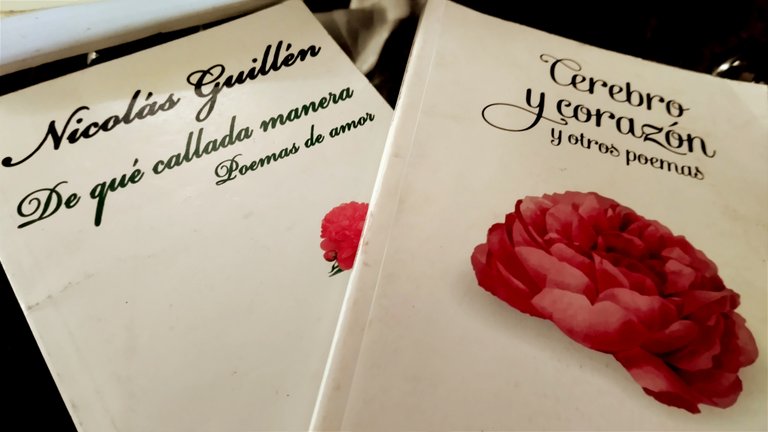
Haven't you ever felt that a book speaks to you? That in another life someone wrote it for you, because of you?
This has happened to me with these two notebooks, and that's why I often carry them with me wherever I go. It's not superstition, but having a poet's soul next to your heart makes you see life in a different way. Guillén has taught me that love, in all its forms, is the most powerful force and is proof that the deepest revolution begins with an embrace and an I love you.
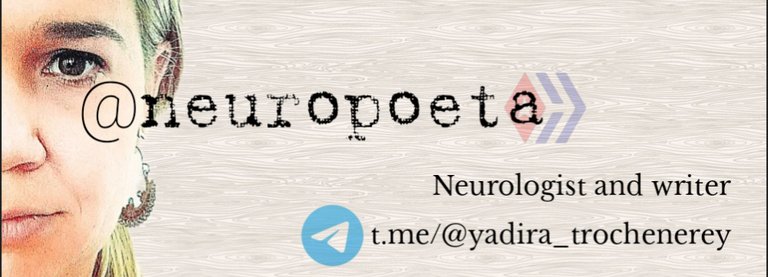
✨ 𝑻𝒉𝒂𝒏𝒌𝒔 𝒇𝒐𝒓 𝒓𝒆𝒂𝒅𝒊𝒏𝒈! ✨
𝑰𝒇 𝒚𝒐𝒖 𝒅𝒐𝒏’𝒕 𝒌𝒏𝒐𝒘 𝒎𝒆 𝒚𝒆𝒕, 𝑰’𝒎 𝒂 𝑪𝒖𝒃𝒂𝒏 𝒏𝒆𝒖𝒓𝒐𝒍𝒐𝒈𝒊𝒔𝒕 𝒂𝒏𝒅 𝒘𝒓𝒊𝒕𝒆𝒓, 𝒂 𝒎𝒐𝒕𝒉𝒆𝒓, 𝒂 𝒘𝒐𝒎𝒂𝒏, 𝒂𝒏𝒅 𝒂 𝒅𝒓𝒆𝒂𝒎𝒆𝒓 𝒘𝒉𝒐’𝒔 𝒇𝒐𝒖𝒏𝒅 𝒊𝒏 𝑯𝒊𝒗𝒆 𝒂 𝒃𝒆𝒂𝒖𝒕𝒊𝒇𝒖𝒍 𝒔𝒑𝒂𝒄𝒆 𝒕𝒐 𝒔𝒐𝒂𝒓.
𝑨𝒍𝒍 𝒕𝒆𝒙𝒕 𝒂𝒏𝒅 𝒊𝒎𝒂𝒈𝒆𝒔 𝒂𝒓𝒆 𝒎𝒚 𝒐𝒓𝒊𝒈𝒊𝒏𝒂𝒍 𝒄𝒓𝒆𝒂𝒕𝒊𝒐𝒏𝒔, 100% 𝒉𝒖𝒎𝒂𝒏-𝒎𝒂𝒅𝒆 (𝒏𝒐 𝑨𝑰).
𝑩𝒂𝒏𝒏𝒆𝒓 𝒅𝒆𝒔𝒊𝒈𝒏𝒆𝒅 𝒃𝒚 𝑳𝒖𝒎𝒊𝒊.
𝑳𝒐𝒗𝒆𝒅 𝒕𝒉𝒊𝒔 𝒑𝒐𝒔𝒕? 𝑼𝒑𝒗𝒐𝒕𝒆, 𝒄𝒐𝒎𝒎𝒆𝒏𝒕, 𝒐𝒓 𝒓𝒆𝒃𝒍𝒐𝒈 𝒕𝒐 𝒔𝒑𝒓𝒆𝒂𝒅 𝒕𝒉𝒆 𝒘𝒊𝒏𝒈𝒔 𝒐𝒇 𝒄𝒓𝒆𝒂𝒕𝒊𝒗𝒊𝒕𝒚! 💛

VERSIÓN EN ESPAÑOL

El amor que palpa y cura en Guillén || Reseña
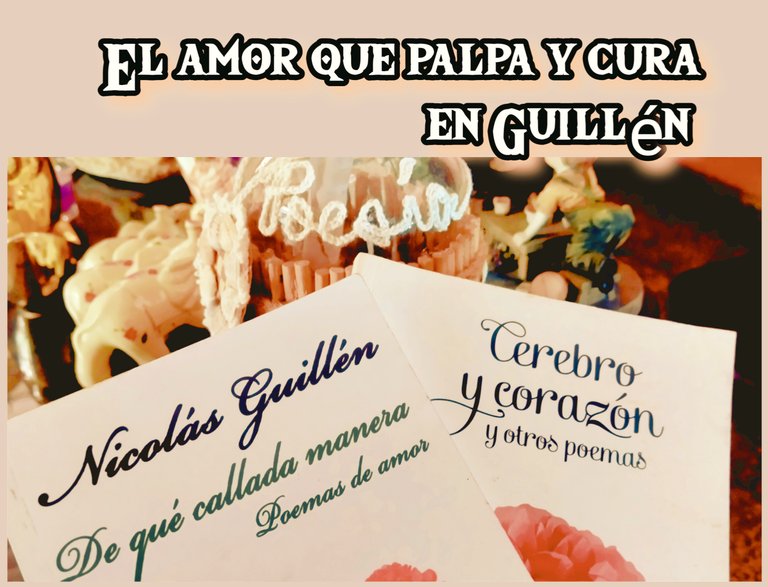
Bien recuerdo el día en que uno de estos dos libros llegó a mis manos. En el marco de una Feria del Libro en mi ciudad, habíamos sido invitados varios poetas a una lectura sobre la poesía de amor de Nicolás Guillén, ese Nicolás Guillén que tenemos como poeta nacional y que siempre vemos desde su arista como poeta antirracista y de reivindicación afroantillana.
Guillén nació en mi ciudad y se convirtió con prontitud en uno de los rostros más particulares de la poesía antillana, en el genuino cantor del mestizaje de esta isla. Pero, junto a esos versos de denuncia a los que acudimos una y otra vez, están también los poemas donde late con fuerza un corazón lírico dedicado al amor.

Esa tarde, en que el libro de poesía de amor de Nicolás Guillén llegó a mis manos, escuché de la voz de una escritora una de las elegías más dolorosas que escuché jamás de la voz de alguien, y era de él, del autor de Tengo y Sóngoro Cosongo.
Luego, con el paso del tiempo, llegó otro poemario del Guillén aún más joven: Cerebro y Corazón, y pude palpar nuevamente a ese poeta romántico del que nos intentan vender otra cara y otra voz.

El amor en la poesía guilleniana es un amor concreto y encarnado; no se trata de un ideal abstracto o etéreo, sino de una pasión que se vive a través del cuerpo y de la geografía de la piel y el dolor.
Cerca de ti, ¿por qué tan lejos verte?
¿Por qué noche decir, si es mediodía?
Si arde mi piel, ¿por qué la tuya es fría?
Si digo vida yo, ¿por qué tú muerte?

Aunque escribió casi siempre desde el modernismo o la vanguardia, en este soneto vemos al Guillén desnudo de sentimientos, gritando por el amor que palpa y cura. Hay un hombre enamorado y nostálgico que convierte su poesía, no en un apéndice de su obra, sino en un cimiento íntimo y humano para toda ella.
La recopilación de su poesía de amor termina con el más desgarrador de los poemas, del que he podido escuchar rumores y anécdotas de su creación. Recuerden que Nicolás Guillén, aun siendo el Poeta Nacional de mi país, fue camagüeyano como yo, y en las calles se cuentan tantas cosas. De esa elegía de la que un día me enamoré y que leí estando dolorosamente herida por una decepción amorosa, cuentan que Guillén no quiso nunca publicarla porque no pretendía que la protagonista de tanto verso fuerte lo leyera. Alguien lo convenció, y hoy la conservo en estas páginas para que también me acompañe a mí.
La forma de la muerte no es una calavera.
Es tu ausencia
como una llanura calcinada.

Como ven, su poesía de amor está marcada por una profunda melancolía y un sentimiento de pérdida. Vemos cómo el mismo poeta que cantó al gozo corporal con tanta vitalidad no le huye al dolor que ese mismo amor puede causar cuando se va.
En Cerebro y Corazón, el otro de los libros que abrazo con ustedes hoy, hay un joven Guillén que exhibe lo primero de su producción poética, donde ya se podía ver cómo comulgaba el amor junto a las inquietudes que luego lo hicieron uno de los pilares de la literatura hispanoamericana del siglo XX.

¿Ustedes no han sentido en ocasiones que un libro les habla? ¿Que en otra vida alguien lo escribió para ti, por ti?
A mí me ha pasado con estos dos cuadernos, y por eso a menudo los llevo conmigo a donde quiera que vaya. No es superstición, pero tener el alma de un poeta al lado de tu corazón te hace ver la vida de una manera diferente. Guillén me ha enseñado que el amor en todas sus formas es la fuerza más poderosa y es la prueba de que la revolución más profunda comienza en un abrazo y en un te amo.
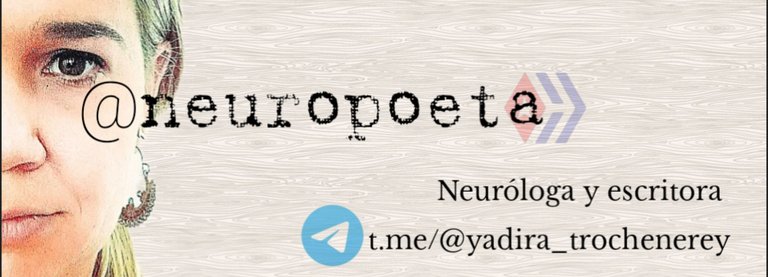
✨ ¡𝑮𝒓𝒂𝒄𝒊𝒂𝒔 𝒑𝒐𝒓 𝒍𝒆𝒆𝒓! ✨
𝑺𝒊 𝒂ú𝒏 𝒏𝒐 𝒎𝒆 𝒄𝒐𝒏𝒐𝒄𝒆𝒔: 𝒔𝒐𝒚 𝒏𝒆𝒖𝒓ó𝒍𝒐𝒈𝒂 𝒚 𝒆𝒔𝒄𝒓𝒊𝒕𝒐𝒓𝒂 𝒄𝒖𝒃𝒂𝒏𝒂, 𝒎𝒂𝒅𝒓𝒆, 𝒎𝒖𝒋𝒆𝒓 𝒚 𝒔𝒐ñ𝒂𝒅𝒐𝒓𝒂 𝒒𝒖𝒆 𝒆𝒏𝒄𝒐𝒏𝒕𝒓ó 𝒆𝒏 𝑯𝒊𝒗𝒆 𝒖𝒏 𝒉𝒆𝒓𝒎𝒐𝒔𝒐 𝒆𝒔𝒑𝒂𝒄𝒊𝒐 𝒑𝒂𝒓𝒂 𝒗𝒐𝒍𝒂𝒓.
𝑬𝒍 𝒕𝒆𝒙𝒕𝒐 𝒚 𝒍𝒂𝒔 𝒊𝒎á𝒈𝒆𝒏𝒆𝒔 𝒔𝒐𝒏 𝒅𝒆 𝒎𝒊 𝒂𝒖𝒕𝒐𝒓í𝒂, 100% 𝒉𝒖𝒎𝒂𝒏𝒐𝒔 (𝒔𝒊𝒏 𝑰𝑨).
𝑩𝒂𝒏𝒏𝒆𝒓 𝒅𝒊𝒔𝒆ñ𝒂𝒅𝒐 𝒑𝒐𝒓 𝑳𝒖𝒎𝒊𝒊.
¿𝑻𝒆 𝒈𝒖𝒔𝒕ó 𝒆𝒔𝒕𝒂 𝒑𝒖𝒃𝒍𝒊𝒄𝒂𝒄𝒊ó𝒏? 𝑽𝒐𝒕𝒂, 𝒄𝒐𝒎𝒆𝒏𝒕𝒂 𝒐 𝒓𝒆𝒃𝒍𝒐𝒈𝒖𝒆𝒂 𝒑𝒂𝒓𝒂 𝒂𝒚𝒖𝒅𝒂𝒓 𝒂 𝒅𝒆𝒔𝒑𝒍𝒆𝒈𝒂𝒓 𝒆𝒔𝒕𝒂𝒔 𝒂𝒍𝒂𝒔. 💛
Ayyyyyy, estuviste a mi lado el día que presenté ese libro en la feria del libro Camaguey 2024, recuerdas, mi rubia?
Ay, mi niña, siiiiii.
Yo hoy necesitaba hablar de amor, y qué mejor que esto.
!HUG
La obra verdaderamente buena es esa que es capaz de despertar esas emociones en quien la lee, y hacerte sentir que parece algo escrito para ti o por ti. Un saludo amiga.
Y eso lo alcanzan los escritores auténticos, los que se desnudan en los versos como Guillén.
Gracias, amigo, por siempre estar y leer.
Congratulations @neuropoeta! You have completed the following achievement on the Hive blockchain And have been rewarded with New badge(s)
Your next target is to reach 1750 upvotes.
You can view your badges on your board and compare yourself to others in the Ranking
If you no longer want to receive notifications, reply to this comment with the word
STOPCheck out our last posts: